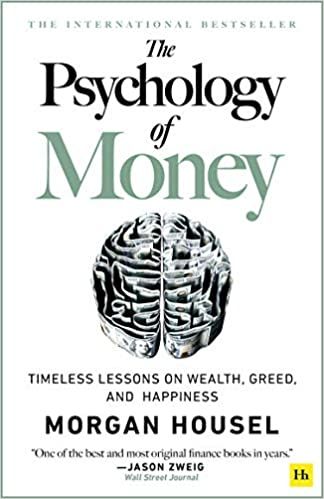
The Psychology of Money provides new insight into how and why consumers interact with money. Morgan Housel shares a series of short stories that allow you to consider the world's interactions with money more closely.
Throughout the book, you’ll approach the concept and consequences of money in terms of behavior. Instead of focusing on math-based logic, Housel dives into the gray area of how people make financial decisions in the real world. He looks beyond the spreadsheet and encourages you to do the same.
What’s The Psychology of Money All About?
The Psychology of Money recognizes that the decisions that people make concerning money are not always data-driven. Instead of following the math-case approached laid out in traditional personal finance books, Housel looks to uncover the way that real money decisions are made.
The behavior of individuals in relation to their finances will have a big impact on their financial future. Since behavior is such a critical factor, the book is dedicated to considering different aspects of how money decisions are made in consumers’ minds.
Chapter Summary
Each chapter is a short story that highlights a particular aspect of psychology and finances. When combined together, you’ll find a thought-provoking experience that allows you to look at the world around you in a different light.
Let’s take a closer look at what each chapter covers.
No One’s Crazy
Housel kicks off The Psychology of Money by pointing out that everyone comes from a different background of life experience. The collection of your life experiences will have a big impact on the way you approach financial decisions.
With that, you shouldn’t consider others crazy when they make financial decisions that are different than yours. I appreciated that Housel set a non-judgmental tone for the rest of the book in this chapter.
Luck & Risk
When you look around, you will see people in various financial situations. Whether you have a solid set up or you are financially insolvent, part of your current situation comes down to luck and risk.
If you are successful, then part of your success was likely due to luck. On the other hand, risk can play a role in a situation where you don’t achieve success.
It's important to recognize both sides of the coin. Housel shares some historical examples of luck and risk that will help to put things in perspective.
Never Enough
If you’ve ever wondered why objectively rich people risk everything to engage in illicit money games, then this is a fun chapter. Housel explores the concept of what is "enough" when it comes to money. Why are some unsatisfied when they seem to have all the money they could ever need?
Confounding Compounding
When you want to grow your wealth, you’ll hear about the power of compounding. The longer you can invest your funds, the better chance you have of achieving success.
In this chapter of The Psychology of Money, you'll explore the math behind Warren Buffett’s fortune. It might surprise you, as well as inspire you to extend your own investment timelines.
Getting Wealthy Vs. Staying Wealthy
Staying wealthy is more tricky than getting wealthy. But how can you keep the wealth you've accumulated? This chapter explores the power of a survival mentality that prioritizes frugality with a slight paranoia of losing it all.
With examples pulled from history, this interesting chapter of The Psychology of Money may force you to reconsider the way you approach your long-term wealth-building strategy.
Tails, You Win
Even with a long investing timeline and consistent investment, you can make bad decisions sometimes. In fact, you should expect to run into some bad money decisions in your lifetime.
However, with proper diversification, one bad investment won't wreck your financial future. Housel shares the process of successful art investors and brings the importance of investment mistakes into the picture.
Freedom
Money cannot buy you happiness in the pursuit of material things. But more freedom in your life can bring happiness. It can be a challenge to recognize the importance of your time and ability to structure your life around your priorities. But doing so may help you to adjust your money approach.
Related: What Does Money Really Mean To You?
Man In The Car Paradox
Material possessions can bring a certain amount of intangible status in your life. But who is it in your life that really cares the most about your possessions?
Your neighbors may not be as impressed with your possessions as you think. In this chapter, Housel shares an interesting story that highlights the truth about material possessions such as fancy cars.
Wealth Is What You Don’t See
Although you can spend your funds on expensive possessions, The Psychology of Money points out that long-term wealth is something that can't be seen from the outside.
In this chapter, you’ll find prominent examples of people that over-leveraged themselves (to create an appearance of wealth) and didn't leave themselves enough money in the bank.
Save Money
We all know that saving money is important. But Housel puts this powerful strategy into perspective. In this chapter, you'll see how you could literally transform your entire financial future by just making a few small changes to your savings goals.
Reasonable > Rational
Although the cold hard math of personal finance can lead to lofty goals, reasonable outcomes are more attainable. It can be incredibly difficult to stick to the spreadsheet without any infusion of your own reasonable expectations. Housel encourages you to consider your own reasonable desires as you build your money plans.
Surprise!
The future is full of surprises that you simply cannot see coming. Yes, it's important that we learn from history as best we can. But The Psychology of Money points out that the needle of history is often moved by outlier events that no one can predict.
Room For Error
Even the best-devised financial strategies don't always go as planned. That's why it's critical to include room for error as you build your financial plans. With interesting references to card counters in Las Vegas, you’ll enjoy this chapter.
You’ll Change
As you build your financial plans, it's easy to make them based on your current needs and desires. But Housel points out that your future desires will likely change as you grow as a person. Over time, you should expect that your dreams will change and your finances will need to adjust.
Nothing’s Free
As consumers, we pay for everything from housing to expensive cars. However, many try to avoid the costs of successful investing by attempting to time the market. In this chapter, you’ll be encouraged to view the ups and downs of investing as a necessity instead of something that should be avoided.
You & Me
In the chapter of The Psychology of Money, Housel again points out that different people will have different financial goals. But when it comes to the market, many investors choose to take cues from the people playing a different financial game. You’ll find relevant examples in recent history of the pitfalls that investors often fall prey to.
The Seduction Of Pessimism
Pessimistic worldviews tend to garner more attention than optimistic outlooks. While pessimism can be hard to resist, it can also lead to big negative consequences for your investment portfolio. Housel dives deeper into the treacherous possibilities of believing the pessimistic hype.
When You’ll Believe Anything
Humans make sense of the world around them by telling themselves a narrative that fits into their worldview. It can be easier to believe fiction than the facts of our world. But these tendencies can lead to big impacts on the economy that affect everyone.
All Together Now
This chapter of The Psychology of Money ties together the short stories to provide a comprehensive picture of how psychology impacts money decisions. In this chapter, Housel offers straightforward advice on how to recognize the power of psychology in your finances.
Confessions
After wrapping up the story, Housel shares his own money strategies. Although he recognizes that some of his decisions may be controversial, he is happy with the freedom he has created in his life. He encourages you to make money decisions that maximize your own peace of mind and help you sleep at night.
Postscript
In the postscript, titled "A Brief History of Why the U.S. Consumer Thinks the Way They Do," Housel walks through a short history lesson. He highlights the interesting evolution of the modern U.S. consumer.
I highly recommend reading this final section if you are interested in the state of the current consumer. I, personally, found it very interesting. But if you are strictly looking for a look at the impacts of psychology on your own personal finances, you can skip the postscript.
About Morgan Housel

Morgan Housel is a well-known financial journalist who is currently a partner at The Collaborative Fund.
In the past, he was a columnist for both The Motley Fool and The Wall Street Journal and won awards for his journalism. Currently, he lives in Seattle with his family.
Who Should Read The Psychology of Money?
The Psychology of Money is not an ordinary personal finance book. You will not find the details on how to budget and invest laid out in a cut and dry format often involved in a personal finance book.
Instead, you will find a series of stories that bring new questions about your own relationship with money to the forefront of your mind. If you approach the book with an open mind, you can learn a lot about how money works and how to harness your own mental approach to money.
Final Thoughts
Overall, The Psychology of Money offers a fresh take on personal finance. Instead of focusing on the minutia of building a financial plan, it provides an inside-out examination of your relationship with money. And armed with this understanding, you’ll be poised to make the inner (mental) decisions that most often lead to future financial success.
Looking for more good books to read? Check out these book reviews:
The Psychology of Money Book Review
-
Easy To Read
-
Useful Or Helpful
-
Storytelling
Overall
Summary
The Psychology Of Money explores the emotional reasons people make bad financial decisions and offers plenty of tools for improvement.

Sarah Sharkey is a personal finance writer covering banking, insurance, credit cards, mortgages and student loans. She has written for numerous finance publications, including MagnifyMoney, Business Insider and ChooseFI. Her blog, Adventurous Adulting, helps young adults get a handle on their finances.
Editor: Clint Proctor Reviewed by: Robert Farrington

